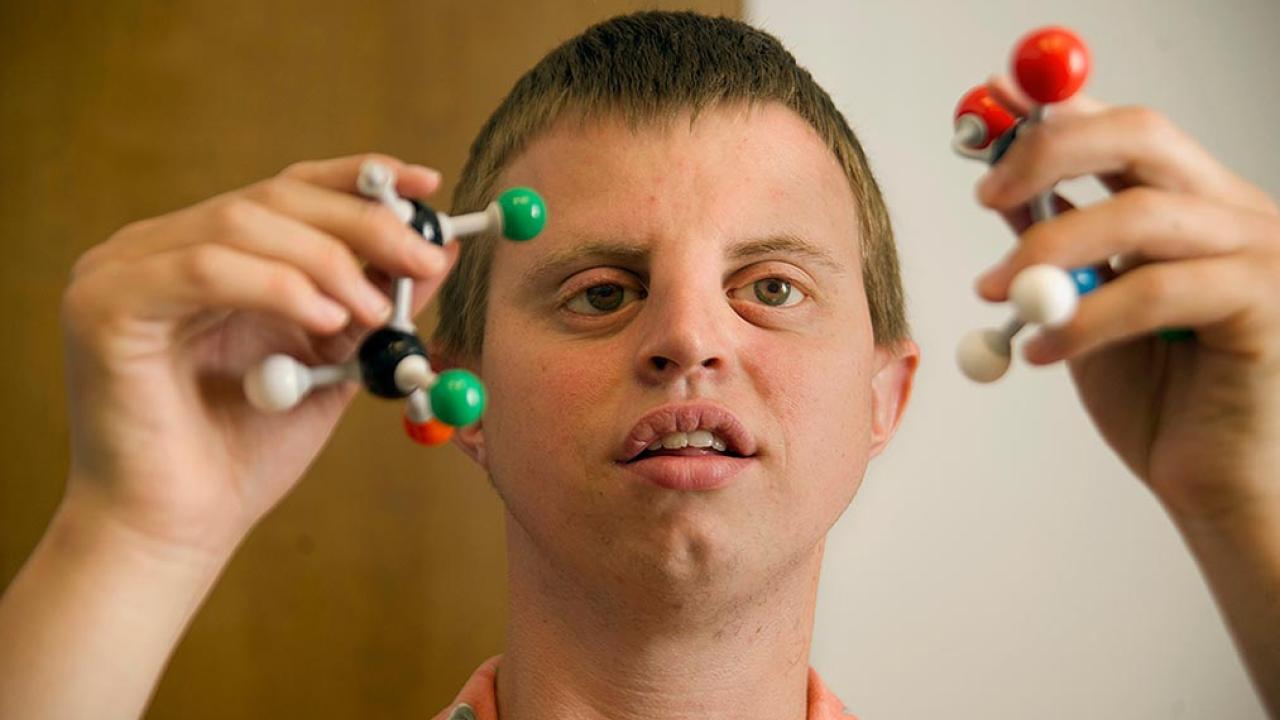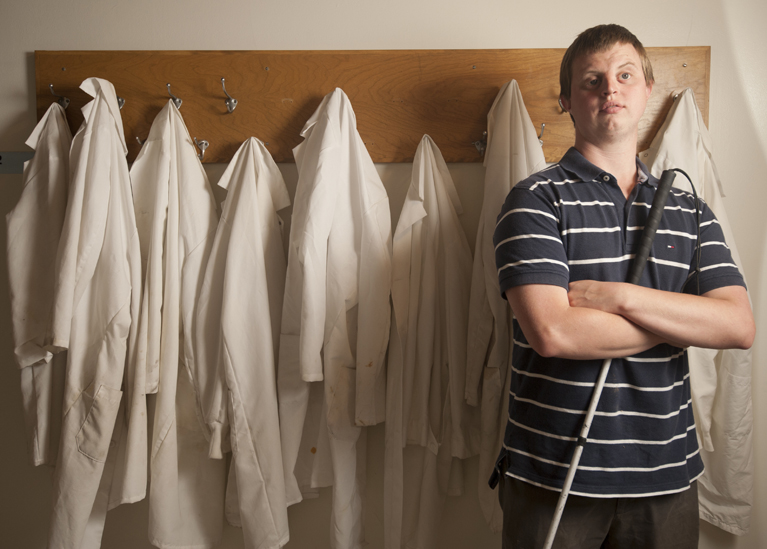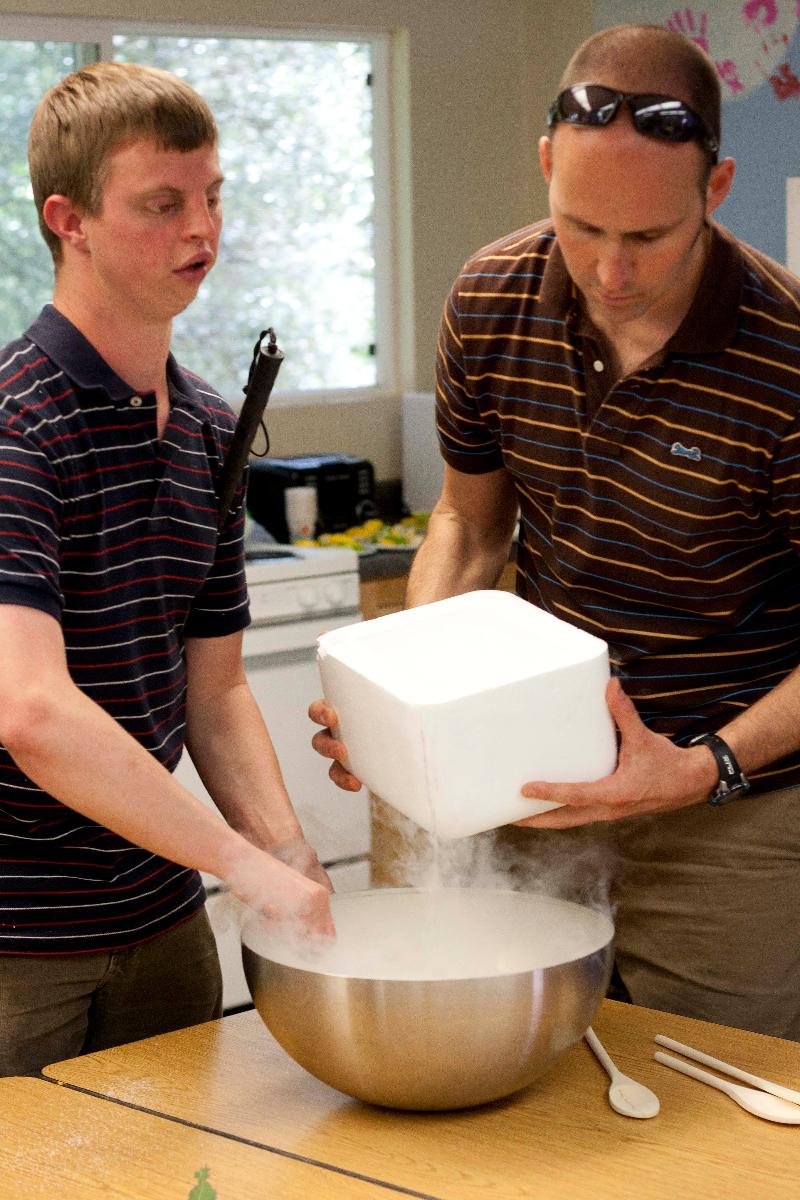
Henry "Hoby" Wedler
What matters to Hoby?
Quick Summary
- Making STEM disciplines accessible to everyone, regardless of their abilities or pre-conceived disabilities.
Henry “Hoby” Wedler, a UC Davis doctoral student in chemistry, spends long hours reading scientific material and running complex lab experiments. But the Petaluma native, who is passionate about science, will never actually see a chemical reaction. That’s because Wedler is blind.

But then Wedler was introduced to chemistry professor Dean Tantillo by Tantillo’s colleague Jared Shaw, from whom he was taking a class at the time. It was the connection and the boost that Wedler needed.
Present scientists with a potential obstacle, such as Wedler’s blindness, and they’ll simply view it as a challenge. Tantillo made the lab equipment accessible to Wedler by creating three-dimensional ball-and-stick models printed on an advanced, state-of-the-art 3-D printer purchased through the generous support of the National Science Foundation as a supplement to Wedler’s pre-doctoral fellowship.
Under Tantillo’s mentorship, Wedler worked hard to educate the department that he could do exactly what his colleagues could. “This department recognizes hard work so well,” Wedler says. “There’s no reason I shouldn’t be working just as hard to accomplish the same results. Having the Chemistry Department realize what I could do as a blind person really made me desire to pursue a graduate degree here."
After that, it simply made sense for Wedler to continue on at UC Davis as a graduate student in organic chemistry, his first love. Following his motto, “expect nothing but hope for everything,” Wedler continues to challenge the belief that impairment of any kind should keep someone from pursuing his or her dreams.
In the chemistry laboratory, Wedler researches computational organic chemistry. The Tantillo group studies organic reaction mechanisms using quantum mechanical calculations. He works with sighted lab mates on some parts of projects that are still very visual, but he and Tantillo always strive for full accessibility in the lab. Wedler ultimately wishes to study organic chemistry computationally without any sighted assistance, a goal which he and the group have come close to accomplishing. After he graduates, Wedler plans to pursue a career in wine education and community college chemistry teaching.
Wedler has benefited enormously through UC Davis scholarships, the Professors for the Future program, and funding from the National Science Foundation. But financial assistance is only a part of his success. His award-winning team of supporters includes Ryan Pemberton, another doctoral student in Tantillo’s group and Wedler’s peer-mentor; Timothy Newman, a doctoral chemistry student who has provided great guidance and wisdom in all technical aspects of Wedler's career and in the teaching setting; Sarah Cohen, an assistant from the disability center who provides tremendous support by reading figures and making things tactile; and professor Philip Power, who “taught organic chemistry in a way that really brought it to life” while Wedler was an undergraduate student. Reflecting on his experience, he states, "The STEM community needs contributions from all kinds of people and UC Davis allows us to give everyone an equal opportunity."

Wedler’s beliefs, academic pursuits, and extracurricular achievements have helped develop his own style as a mentor. He founded Chemistry Camp, now going on four years old, which invites visually impaired students to explore science up close and personal. Students have come from the region and as far as Mexico City, Texas, and Chicago. In 2012, Wedler co-founded a nonprofit organization, Accessible Science, to fund all Chemistry Camp activities. Dean Tantillo serves on the board of directors of this organization.

Wedler has been a guest lecturer at Sonoma State University and at Credo High School, a college prep charter school in Sonoma County. Also at Credo, with the school’s science and woodworking teacher, Julian Shaw, Wedler co-founded Developing Capacities, which pairs Credo students with visiting blind students for a day-long course in woodturning. The program builds confidence in a new art for the blind students as well as helping the Credo students develop a capacity for nonvisual learning.
Wedler is adamant about giving back to his academic and social community, his colleagues, and especially his future students. “Too often, blind and sighted students alike are told that chemistry is difficult and very daunting,” he says, recalling a high school teacher who told him much the same thing. “My goal is to make science and particularly chemistry interesting, exciting, and challenging rather than scary.” Wedler’s hard work has paid off in regional and national recognition, including being named a White House Champion of Change in 2012 and winning the Advocates in Disability Award from the HSC Foundation in 2013.
And, for the past three years, his love and appreciation for the chemistry of wine has led to “Tasting in the Dark,” a blind wine tasting that he hosts two weekends per month at the Francis Ford Coppola Winery in Geyserville, Sonoma County.
Wedler’s heartfelt advice for students of all abilities is to seek out the faculty members who will help make academic endeavors come true. “So many students don’t take advantage of office hours,” he says. “There may be a separation of title and status, but we can all learn from the people around us. Wherever you go, there are going to be great minds out there. I really allowed them to mentor me, and I learned so much.”
Media Resources
- Video about Wedler: "Blind Chemist"
- Part 1 of a two-part story on Wedler's life
- Part 2 of a two-part story on Wedler's life
- Interview on Capitol Public Radio: "Blind Science"
- Video of Wedler discussing the importance of the audiobooks provided by Learning Ally
- Article on Chemistry Camp: "A Whiff Of Chemistry"
- Interview on KQED's The California Report: "Chemistry Camp for the Blind"
- Article on Wedler's "Tasting in the Dark" class
- Interview on The Splendid Table: "Want to really enjoy what a wine has to offer? Try it with a blindfold"
- View Wedler's teaching and mentoring style as he works with the 12-year-old inventor of Braigo, a Lego braille printer
- Article on Shubham Banerjee, inventor of Braigo
